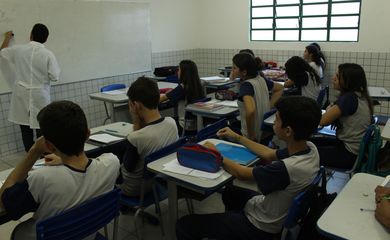Brazil yet to bring 1.9 million children and teenagers to school
Brazil has increased the percentage of children and adolescents in school, but is yet to include at least 1.95 million people aged 4–17.

Under the law, the country should have granted universal access to nursery and high school education by 2016. The targets, however, have not been met, according to a report released today (Jun. 7) by the National Institute for Educational Studies and Research Anísio Teixeira (Inep).
As for nursery school, aimed at kids aged four and five, 91.5% of children were enrolled in 2016. In 2014, when the National Education Plan (PNE) took effect, the percentage of coverage stood at 89.1%, and 604 thousand children were not going to school. In 2016, this figure sank to 450 thousand; 2017 data still not available.
Total inclusion
In education for students aged 6–14, coverage reached 97.8% in 2017—virtually total inclusion. Six hundred thousand children and teenagers are still not attending school in this age group. Coverage is officially expected to total 100% by 2024.
The country should also provide full access to education for 15–17-year-olds, who were supposed to be attending high school (many are still in previous grades). In this group, coverage added up to 91.3% in 2017, with 900 thousand not going to school and not graduated.
Unlike preschool, in which the supply is the biggest obstacle for inclusion, dropping out of school is the key issue among teenagers. “These adolescents were going to school and decided to quit at some point in their school lives. Some choose to drop out before the school year is over,” the report says.
Approved in 2014, the PNE sets targets and outlines strategies aimed at improving education from preschool to graduate programs. The plan must be carried out by 2024, but intermediary regulations are available to will make it possible to meet the targets until then. The deadline for the universal access to both preschool and high school ended, however, in 2016.
Should Brazil’s growing trend hold steady, the report argues, the PNE targets will be met sometime between 2018 and 2020.



